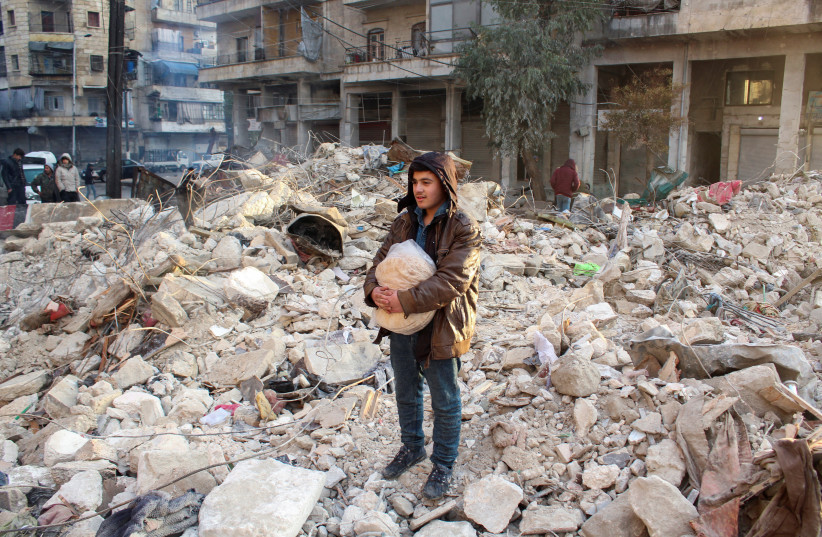With Syrians stranded outside in the cold in northwest Syria, countries are scrambling to send aid, some of which will be flowing through Damascus to Syria-controlled areas, like Aleppo and Latakia. Allies of the Syrian regime have stepped forward to provide aid.
Iran, for one, sent a Qeshm Fars Air 747 to Damascus on Monday night after the earthquake to help. Hezbollah issued a statement calling on countries and organizations to “use all available resources to reduce the pain and suffering of these two earthquake-stricken countries.”
Iran is in the midst of providing aid to its own earthquake victims, so it’s not clear what they can and will send. Already thousands have been declared dead and the toll is expected to rise.
Because Syria is divided between areas controlled by the Syrian regime, Turkey and armed groups in the northwest, it will be difficult to get even a preliminary estimate of the number of dead and injured. So far, the Syrian-controlled areas suffered the most harm.
It is also unclear from Hezbollah’s statement if it is actually going to try to help. The Iranian proxy group sent forces into Syria in 2012 to support the Syrian regime during the civil war and was an important player in areas affected by the earthquake in frontlines near Aleppo and Idlib.

Syria ravaged by deadly earthquake
It’s unclear how many Hezbollah operatives are still there though. Hezbollah is an extrajudicial terrorist army in Lebanon, but it also plays a role in government and politics and other aspects of society, trafficking weapons through Syria.
By Monday evening, Syria’s health ministry said that 711 people had been killed in Latakia, Aleppo, Hama and Tartus, while aid teams said the death toll rose to more than 733 in northern Syria, with another 1,000 injured. By mid-Tuesday the death toll rose to 764 deaths and 1,448 injuries in the governorates of Aleppo, Latakia, Hama, Idlib countryside, and Tartous, Syrian government sources noted. These numbers may rise.
Iranian Foreign Minister Hossein Amir-Abdollahian called his Turkish counterpart and said Iran is prepared to send aid via the Red Crescent as well as a medical support team. Tehran has said that its consulate in Erzurum, in eastern Turkey, is prepared to help Iranians, including students, who reside there.
Turkey is home to many Iranians, some of whom fled their homeland or are dissidents. Iran has been rocked by persistent protests over the last five months and many asylum seekers and refugees looking to get out go to Turkey and – sometimes from there – to the West. Some of them are Afghans or Kurds who are fleeing suffering and poverty in their own regions.
The presence of undocumented people in areas where the earthquake struck will make accounting for the loss of life more difficult because they may have been living in vulnerable buildings and there also may not be any proper record of them.
Iran said that a “medical and relief team of the Iranian Red Crescent will arrive in Turkey tonight to help rescue the injured.” It is not clear yet what kind of aid Iran has sent to Syria. However, the plane reportedly contained 45 tons of relief material, including medical supplies.
According to Al-Mayadeen media, considered pro-Iran and well connected in Syria and Lebanon, people in Syria are sleeping in the streets away from buildings because of fears that unstable buildings may collapse. There have also been aftershocks. The report says that in areas under Syrian regime control, people are also finding refuge in mosques and churches.
“Eighteen shelters for the affected people were opened in Aleppo, along with 34 other centers in Tartous,” The report reads. In Aleppo, where some buildings collapsed, people are sleeping in the streets and public parks, even though there are very cold temperatures and a winter storm.
On Tuesday, two Iraqi planes arrived in Damascus with 70 tons of relief supplies. Two Russian planes also arrived at Latakia, and a flight from the UAE and India also arrived in the capital, al-Mayadeen said.
Iraq’s prime minister says that his country opened an “air bridge” to aid Syria and Turkey, sending urgent relief, including medical supplies and first aid. A statement in the UAE said that Iraq was sending $13.5 million worth of aid to the people of Syria.
